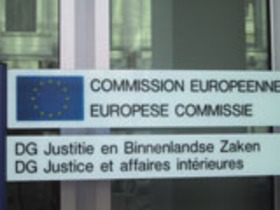

The objective of co-operation in the field of Justice and Home Affairs is to create an "Area of freedom, security and justice" that will cover the entire European Union. This is also the headline for Title V in the Lisbon Treaty.
* The Union has no internal borders and common borders externally.
* There is a common policy on asylum, immigration and external border control.
* The EU shall combat crime, racism and xenophobia.
* Police and judicial authorities shall cooperate and coordinate.
* There shall be mutual recognition of judgments.
* Common fight against terrorism, human trafficking, sexual exploitation, illicit drug trafficking, money laundering, corruption, counterfeiting, computer crime, organised crime and new areas after unanimous decision.
* Judicial cooperation in civilian matters.
* Family law by unanimity unless the member states unanimously change it for qualified majority voting.
Europol and Eurojust will be supplemented with a"European Public Prosecutor`s Office, see Art. 86 TFEU.
In the most sensitive areas member states can veto joint decisions in a summit. 1/3 of the member states can then decide it as a cooperation between them.
The Lisbon Treaty provides for the entire scope of Justice and Home Affairs as a shared competence, with qualified majority voting in the Council and co-decision with the European Parliament.
Shared competence means that EU law will come instead of national law gradually. When the EU has decided member states are not allowed to decide any longer over the given topic.
The chapter can be found in Arts. 67-89 TFEU.
The Lisbon Treaty turns the previous intergovernmental co-operation into a supra-national one, with the Commission gaining the right of legislative initiative and the EU Court the respective competence over relevant disputes and court-cases.
According to the Lisbon Treaty, a group consisting of 25% of the member states can also propose laws in the sphere of Justice and Home Affairs. This is the only area where the Commission has no monopoly of initiative.
HISTORY
JHA was previously one of the “pillars” of the European Union. Originally it was based upon intergovernmental co-operation between member states, but it partly became subject to supra-national qualified majority decision-making (a result of the Treaty of Amsterdam).
Intergovernmental police and judicial co-operation in criminal matters was dealt with under Title VI of the TEU, in the Nice Treaty. It included cross-national co-operation against racism, terrorism, drugs, arms and fraud.
The Community Treaty (TEC) Title IV dealt with visas, asylum, immigration and other policies related to the free movement of persons. It provided for supra-national co-operation on border control, refugees and immigration.
Police: The TEU provided for closer co-operation between police forces and other authorities, including the use of the common police unit Europol in The Hague. Police co-operation in the EU included operational co-operation, common actions and co-ordinated investigation teams.
Judiciary: The closer co-operation between judicial bodies used the common judicial co-operation unit, Euro-just Eurojust. Judicial co-operation included co-ordination between prosecuting authorities, investigations in relation to cross-border crime and implementation of extradition requests.
The Council could take most decisions by qualified majority voting, but sensitive issues required unanimity. Denmark, Ireland and the UK have derogations as legal opt-outs from all or some of these provisions.
Links
Activities of the European Union: Justice, freedom and security http://europa.eu/pol/justice/index_en.htm